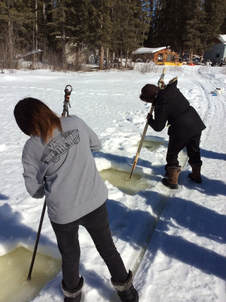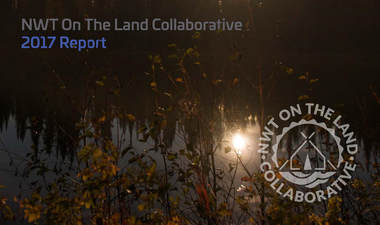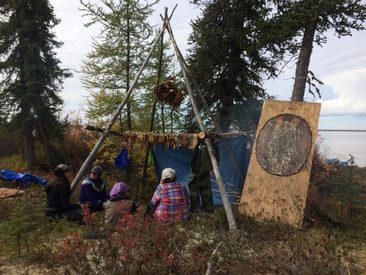 This year, the NWT On The Land Collaborative will distribute $1 million dollars in grants to 48 projects across the territory that connect NWT residents with their land, culture, and community. “Four years ago when the Collaborative was just an idea, I never imagined in such a short time we’d have a million dollars in the bank to put towards programming,” remarks Meghan Etter, the Community Advisor for the Inuvialuit Settlement Region. Community Advisors are appointed by Indigenous governments in each region to serve as representatives for the Collaborative. They provide on-the-ground support to projects throughout the process, while also assisting in the selection of recipients and in providing strategic direction to the Collaborative. The outcomes of on the land programming are as numerous as they are varied, but one thing is certain: they support the health and wellbeing of communities, families, and individuals, and are vital to healthy ecosystems and economies in the North. This is the third year the Collaborative has been administering grants to land-based initiatives in the NWT. In year one, the Collaborative gave out $381,850 to 35 projects. Last year, the pot of $634,845 was spread across 35 projects. The average grant amount continues to grow from almost $11,000 in 2016 to just over $18,000 in 2017 to almost $21,000 per project this year. This year also marks an increase in the number of projects receiving full funding. More than half of the successful applicants were fully funded. This is an important marker of success for the Collaborative, which is dedicated to making it easier and less time consuming for organizations and communities to access funds for land-based programs. As in previous years, there is a wide range of grant amounts and project types. Small grant recipients include an ice fishing program in Whatì and a land- and culture-based retreat for LGBTQ+ students and their allies in the South Slave. Medium-sized grants will allow the Ulukhaktok Community Corporation to run a summer Inuinnaqtun camp for young people in their community and Chief Julius School in Teetł’it Zheh to immerse students in traditional Gwich’in culture while travelling on Teetł’it Gwinjik (Peel River). Large grants have been awarded to the Dehcho K’ehodi Stewardship & Guardian Program and the Tulít’a Dene Band to bring elders and youth together for a walking journey along traditional Shúhtagot’ine trails. In addition to financial support, funded projects may also receive access to equipment, training, and program support. Quick Facts
Contact Steve Ellis Program Lead, Northern Canada Tides Canada Email: [email protected] Phone: 867.988.1963 Jess Dunkin Director, On the Land Programs NWT Recreation and Parks Association Email: [email protected] Phone: 867.669.8376
2 Comments
 Today, the NWT On The Land Collaborative releases its second annual report. The 2017 Report shares highlights from the past year, including new partners, the first annual learning trip, and the creation of a community of practice for land-based programs with a mental health focus. The NWT On The Land Collaborative was founded in fall 2015 to support programs that connect NWT residents with their land, culture, and community. Since that time, the Collaborative has provided 70 projects across the territory with over a million dollars in funds. Grant recipients also have access to equipment, training, expertise, and other resources. The 2017 Report features seven successful land-based projects, one from each region, that received grants in 2016. These include the Reviving Trails project organized by the Dedats’eetsaa (Tłįchǫ Research and Training Institute); the Feeding Our Spirits project, an initiative of Trailcross; and East Three Secondary School’s Wood for Elders program. The report also details the allocation of funds for 2017. This year, grants range from $3,000 to support a canoe trip for grade nine students in Fort Smith to $60,000 for healing and wellness camps for youth in Rádeyįlįkóé (Fort Good Hope). Other funded projects include Trails on the Land, a 10-day trip beginning in Tuktoyaktuk that will take youth and elders through the traditional hunting territory of their ancestors; a land-based youth mentorship project coordinated by the Deh Gah Gotine First Nation; a boating program for Tłįchǫ youth that teaches traditional knowledge and skills; and a hide tanning camp in Łutsel K’e. Quick Facts
Contacts Steve Ellis Program Lead, Northern Canada Tides Canada Email: [email protected] Phone: 867.988.1963 Jess Dunkin Director, On the Land Programs NWT Recreation and Parks Association Email: [email protected] Phone: 867.669.8376  On the land programs promote community, family, and individual wellbeing, and are vital to healthy ecosystems and economies. This year, the NWT On The Land Collaborative will distribute $634,845 to 35 projects across the territory that connect NWT residents with their land, culture, and community. This is the second year that the Collaborative has been administering grants to on the land programs in the NWT. Coincidentally, the Collaborative also supported 35 projects in 2016. However, the average grant has risen by 62% to just over $18,000: “Although we are supporting the same number of projects this year, we have been able to fully fund more projects, which means that they don’t have to go elsewhere for funds to make their programs happen,” shares Steve Ellis of Tides Canada, one of the driving forces behind the Collaborative. As the funding pot grows, the Collaborative is better able to meet its mandate of making it easier and less time consuming for people to access funds for land-based programs. Grants range from $3000 to support a canoe trip for grade nine students in Fort Smith to $60,000 for healing and wellness camps for youth in Rádeyįlįkóé (Fort Good Hope). Other funded projects include Trails on the Land, a 10-day trip beginning in Tuktoyaktuk that will take youth and elders through the traditional hunting territory of their ancestors; a land-based youth mentorship project coordinated by the Deh Gah Gotine First Nation; a boating program for Tłįchǫ youth that teaches traditional knowledge and skills; and a hide tanning camp in Łutsel K’e. In addition to financial support, funded projects may also receive equipment, training, and program support. Quick Facts
Contacts Steve Ellis Northern Lead Tides Canada Email: [email protected] Jess Dunkin Director, On the Land Programs NWT Recreation and Parks Association Email: [email protected] |
AuthorWrite something about yourself. No need to be fancy, just an overview. Archives
April 2021
Categories |
 RSS Feed
RSS Feed